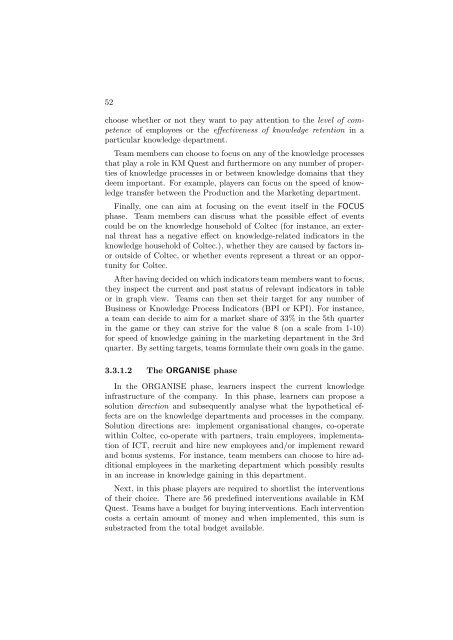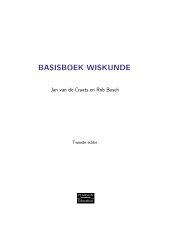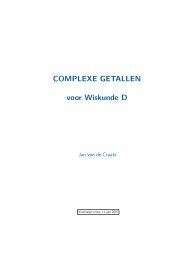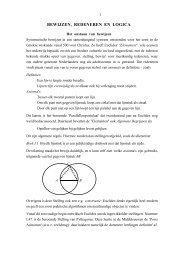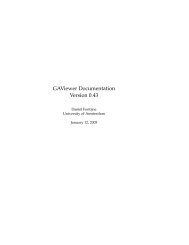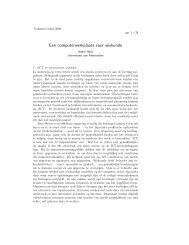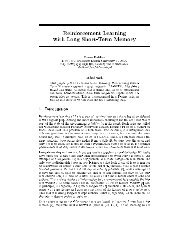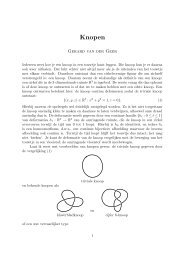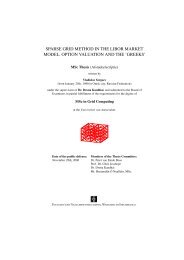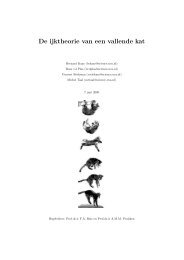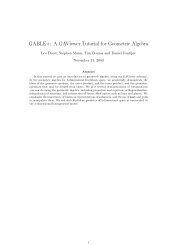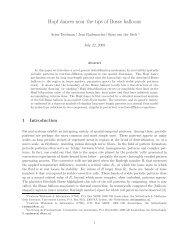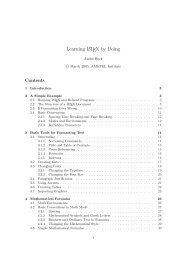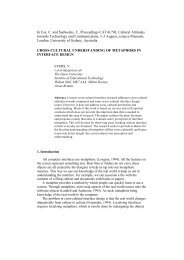The role of metacognitive skills in learning to solve problems
The role of metacognitive skills in learning to solve problems
The role of metacognitive skills in learning to solve problems
Create successful ePaper yourself
Turn your PDF publications into a flip-book with our unique Google optimized e-Paper software.
52<br />
choose whether or not they want <strong>to</strong> pay attention <strong>to</strong> the level <strong>of</strong> competence<br />
<strong>of</strong> employees or the effectiveness <strong>of</strong> knowledge retention <strong>in</strong> a<br />
particular knowledge department.<br />
Team members can choose <strong>to</strong> focus on any <strong>of</strong> the knowledge processes<br />
that play a <strong>role</strong> <strong>in</strong> KM Quest and furthermore on any number <strong>of</strong> properties<br />
<strong>of</strong> knowledge processes <strong>in</strong> or between knowledge doma<strong>in</strong>s that they<br />
deem important. For example, players can focus on the speed <strong>of</strong> knowledge<br />
transfer between the Production and the Market<strong>in</strong>g department.<br />
F<strong>in</strong>ally, one can aim at focus<strong>in</strong>g on the event itself <strong>in</strong> the FOCUS<br />
phase. Team members can discuss what the possible effect <strong>of</strong> events<br />
could be on the knowledge household <strong>of</strong> Coltec (for <strong>in</strong>stance, an external<br />
threat has a negative effect on knowledge-related <strong>in</strong>dica<strong>to</strong>rs <strong>in</strong> the<br />
knowledge household <strong>of</strong> Coltec.), whether they are caused by fac<strong>to</strong>rs <strong>in</strong>or<br />
outside <strong>of</strong> Coltec, or whether events represent a threat or an opportunity<br />
for Coltec.<br />
After hav<strong>in</strong>g decided on which <strong>in</strong>dica<strong>to</strong>rs team members want <strong>to</strong> focus,<br />
they <strong>in</strong>spect the current and past status <strong>of</strong> relevant <strong>in</strong>dica<strong>to</strong>rs <strong>in</strong> table<br />
or <strong>in</strong> graph view. Teams can then set their target for any number <strong>of</strong><br />
Bus<strong>in</strong>ess or Knowledge Process Indica<strong>to</strong>rs (BPI or KPI). For <strong>in</strong>stance,<br />
a team can decide <strong>to</strong> aim for a market share <strong>of</strong> 33% <strong>in</strong> the 5th quarter<br />
<strong>in</strong> the game or they can strive for the value 8 (on a scale from 1-10)<br />
for speed <strong>of</strong> knowledge ga<strong>in</strong><strong>in</strong>g <strong>in</strong> the market<strong>in</strong>g department <strong>in</strong> the 3rd<br />
quarter. By sett<strong>in</strong>g targets, teams formulate their own goals <strong>in</strong> the game.<br />
3.3.1.2 <strong>The</strong> ORGANISE phase<br />
In the ORGANISE phase, learners <strong>in</strong>spect the current knowledge<br />
<strong>in</strong>frastructure <strong>of</strong> the company. In this phase, learners can propose a<br />
solution direction and subsequently analyse what the hypothetical effects<br />
are on the knowledge departments and processes <strong>in</strong> the company.<br />
Solution directions are: implement organisational changes, co-operate<br />
with<strong>in</strong> Coltec, co-operate with partners, tra<strong>in</strong> employees, implementation<br />
<strong>of</strong> ICT, recruit and hire new employees and/or implement reward<br />
and bonus systems. For <strong>in</strong>stance, team members can choose <strong>to</strong> hire additional<br />
employees <strong>in</strong> the market<strong>in</strong>g department which possibly results<br />
<strong>in</strong> an <strong>in</strong>crease <strong>in</strong> knowledge ga<strong>in</strong><strong>in</strong>g <strong>in</strong> this department.<br />
Next, <strong>in</strong> this phase players are required <strong>to</strong> shortlist the <strong>in</strong>terventions<br />
<strong>of</strong> their choice. <strong>The</strong>re are 56 predef<strong>in</strong>ed <strong>in</strong>terventions available <strong>in</strong> KM<br />
Quest. Teams have a budget for buy<strong>in</strong>g <strong>in</strong>terventions. Each <strong>in</strong>tervention<br />
costs a certa<strong>in</strong> amount <strong>of</strong> money and when implemented, this sum is<br />
substracted from the <strong>to</strong>tal budget available.


